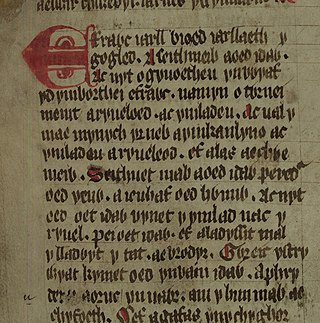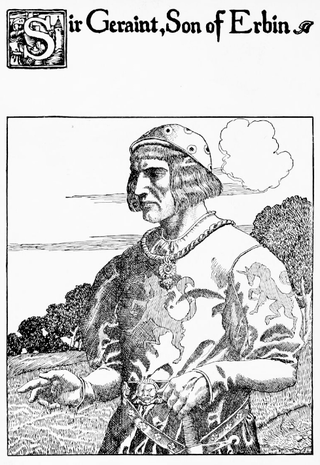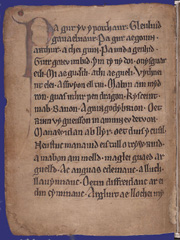Related Research Articles

King Arthur, according to legends, was a king of Britain. He is a folk hero and a central figure in the medieval literary tradition known as the Matter of Britain.

Taliesin was an early Brittonic poet of Sub-Roman Britain whose work has possibly survived in a Middle Welsh manuscript, the Book of Taliesin. Taliesin was a renowned bard who is believed to have sung at the courts of at least three kings.

The Mabinogion are the earliest Welsh prose stories, and belong to the Matter of Britain. The stories were compiled in Middle Welsh in the 12th–13th centuries from earlier oral traditions. There are two main source manuscripts, created c. 1350–1410, as well as a few earlier fragments. The title covers a collection of eleven prose stories of widely different types, offering drama, philosophy, romance, tragedy, fantasy and humour, and created by various narrators over time. There is a classic hero quest, "Culhwch and Olwen"; a historic legend in "Lludd and Llefelys", complete with glimpses of a far off age; and other tales portray a very different King Arthur from the later popular versions. The highly sophisticated complexity of the Four Branches of the Mabinogi defies categorisation. The stories are so diverse that it has been argued that they are not even a true collection.

Peredur is the name of a number of men from the boundaries of history and legend in sub-Roman Britain. The Peredur who is most familiar to a modern audience is the character who made his entrance as a knight in the Arthurian world of Middle Welsh prose literature.

Welsh mythology consists of both folk traditions developed in Wales, and traditions developed by the Celtic Britons elsewhere before the end of the first millennium. As in most of the predominantly oral societies Celtic mythology and history were recorded orally by specialists such as druids. This oral record has been lost or altered as a result of outside contact and invasion over the years. Much of this altered mythology and history is preserved in medieval Welsh manuscripts, which include the Red Book of Hergest, the White Book of Rhydderch, the Book of Aneirin and the Book of Taliesin. Other works connected to Welsh mythology include the ninth-century Latin historical compilation Historia Brittonum and Geoffrey of Monmouth's twelfth-century Latin chronicle Historia Regum Britanniae, as well as later folklore, such as the materials collected in The Welsh Fairy Book by William Jenkyn Thomas (1908).

The historicity of King Arthur has been debated both by academics and popular writers. While there have been many claims that King Arthur was a real historical person, the current consensus among specialists on the period holds him to be a mythological or folkloric figure.

The Black Book of Carmarthen is thought to be the earliest surviving manuscript written solely in Welsh. The book dates from the mid-13th century; its name comes from its association with the Priory of St. John the Evangelist and Teulyddog at Carmarthen, and is referred to as black due to the colour of its binding. It is currently part of the collection of the National Library of Wales, where it is catalogued as NLW Peniarth MS 1.

Y Gododdin is a medieval Welsh poem consisting of a series of elegies to the men of the Brittonic kingdom of Gododdin and its allies who, according to the conventional interpretation, died fighting the Angles of Deira and Bernicia at a place named Catraeth in about AD 600. It is traditionally ascribed to the bard Aneirin and survives only in one manuscript, the "Book of Aneirin".

Geraint is a character from Welsh folklore and Arthurian legend, a valiant warrior possibly related to the historical Geraint, an early 8th-century king of Dumnonia. It is also the name of a 6th-century Dumnonian saint king from Briton hagiographies, who may have lived during or shortly prior to the reign of the historical Arthur. The name Geraint is a Welsh form of the Latin Gerontius, meaning "old man".
The Three Welsh Romances are three Middle Welsh tales associated with the Mabinogion. They are versions of Arthurian tales that also appear in the work of Chrétien de Troyes. Critics have debated whether the Welsh Romances are based on Chrétien's poems or if they derive from a shared original. The Romances survive in the White Book of Rhydderch and the Red Book of Hergest, both from the 14th century, though the material is at least as old as Chrétien.

Preiddeu Annwfn or Preiddeu Annwn is a cryptic poem of sixty lines in Middle Welsh, found in the Book of Taliesin. The text recounts an expedition with King Arthur to Annwfn or Annwn, the Otherworld in Welsh.
Llywarch Hen, was a prince and poet of the Brythonic kingdom of Rheged, a ruling family in the Hen Ogledd or "Old North" of Britain. Along with Taliesin, Aneirin, and Myrddin, he is held to be one of the four great bards of early Welsh poetry. Whether he actually wrote the poems attributed to him is unknown, and most of what is known about his life is derived from early medieval poems which may or may not be historically accurate.
The Englynion y Beddau is a Middle Welsh verse catalogue listing the resting places (beddau) of legendary heroes. It consists of a series of englynion, or short stanzas in quantitative meter, and survives in a number of manuscripts. The collection is thought to be considerably older than its earliest manuscript, the 13th-century Black Book of Carmarthen, and provides an important early glimpse at medieval Welsh heroic tradition and topographical folklore.

Edern ap Nudd was a knight of the Round Table in Arthur's court in early Arthurian tradition. As the son of Nudd, he is the brother of Gwyn, Creiddylad, and Owain ap Nudd. In French romances, he is sometimes made the king of a separate realm. As St Edern, he has two churches dedicated to him in Wales.
Gwrhyr Gwalstawd Ieithoedd; "Gwrhyr, Interpreter of Languages" is a hero and shapeshifter of early Welsh literature and mythology and a warrior of King Arthur's court at Celliwig. He appears most prominently in the early Arthurian tale Culhwch and Olwen, in which he is handpicked among Arthur's knights to accompany Culhwch on his quest to win Olwen.

Dywel fab Erbin is a minor character and warrior of Welsh tradition, the son of Erbin and the brother of Geraint and Ermid. Alongside his brothers, he is named in the early Arthurian tale Culhwch ac Olwen as a knight of Arthur's court at Celliwig.
Englynion y Clywaid is a collection of Welsh stanzas.
The Juvencus Manuscript is one of the main surviving sources of Old Welsh. Unlike much Old Welsh, which is attested in manuscripts from later periods and in partially updated form, the Welsh material in the Juvencus Manuscript was written in the Old Welsh period itself; the manuscript provides the first attestation of many Welsh words.

Poem 31 of the Black Book of Carmarthen, a mid-13th century manuscript, is known from its first line as Pa gur yv y porthaur? or Pa gur, or alternatively as Ymddiddan Arthur a Glewlwyd Gafaelfawr. It is a fragmentary, anonymous poem in Old Welsh, taking the form of a dialogue between King Arthur and the gatekeeper Glewlwyd Gafaelfawr, in which Arthur boasts of his own exploits and those of his companions, especially Cai the Fair. Pa gur is notable for being one of the earliest vernacular Arthurian works, and for alluding to several early adventures of Arthur which are now lost. Its precise age is not known and has been the subject of wide-ranging disagreement, but scholarly opinion now tends to favour a date of c. 1100.

Cyfoesi Myrddin a Gwenddydd ei Chwaer is an anonymous Middle Welsh poem of uncertain date consisting of 136 stanzas, mostly in englyn form. Myrddin, the legendary 6th-century North British bard and warrior, is depicted as being encouraged by his sister Gwenddydd to utter a series of prophecies detailing the future history of the kings of Gwynedd, leading up to an apocalyptic ending. The mood of the poem has been described as "one of despair and of loss of faith and trust in this world".